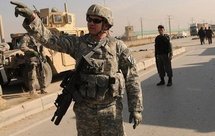Risks limit civilian movement in Afghanistan: Clinton
AFP
WASHINGTON - US Secretary of State Hillary Clinton conceded Thursday that security concerns limited movement for American civilians working in Afghanistan, but said US troops still escorted them to key places.
"We're quite encouraged by how much of our civilian team has been able to get out into parts of Afghanistan that are targets for our civilian assistance," Clinton told reporters.

(AFP/File/Massoud Hossaini)
"So what we're doing is embedding a lot of our civilians with our military troops," the chief US diplomat said as she stood next to Jandrokovic.
The policy allows the civilian experts and aid workers to get out "at the same time or literally the next day after the Marines and the army have sent the go signal that civilians can begin to work with... the Afghan people on a range of issues," she said.
But John Dempsey, a United States Institute of Peace analyst, told AFP last month that if civilians are stuck mainly on a military base or with armed escorts, "the impact of the increase will be marginal yet expensive."
President Barack Obama has called for increasing the number of civilian experts from 320 in January 2009 to 974 by January 2010 in order to help the Kabul government serve its people and wean the economy off opium production.
Jack Lew, the deputy secretary of state for management and resources, told US lawmakers Wednesday that he forecast a "20 to 30 percent" increase in 2010 above the current civilian target of 974.
Jandrokovic said Croatia, which became a NATO member in April, will contribute more to Afghanistan following Obama's appeals for greater allied contributions to support his new strategy.
"Croatia is committed to strengthening its presence in Afghanistan and is seeking ways to further contribute to NATO's key efforts," the minister told reporters.
"We believe that training Afghan security and police forces to assume ownership for security in their country is the most important task," he said.
---------------------------------------------------------------------------------------------------------------------------------